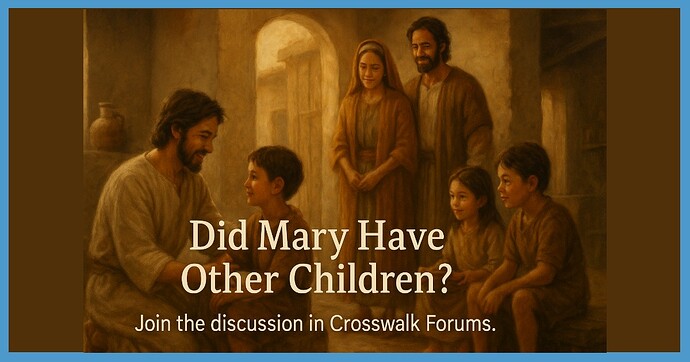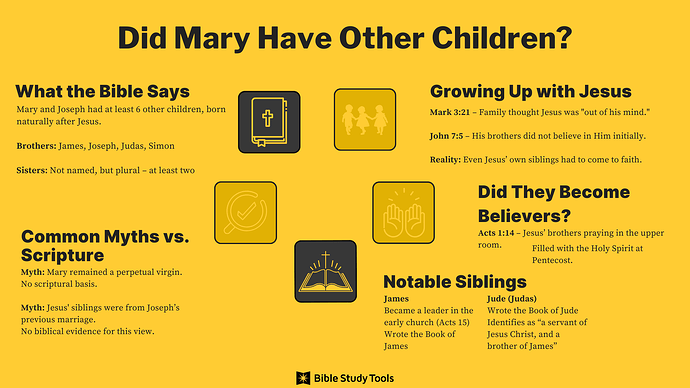Ah, brother Samuel_23… welcome back from exams, and I do mean that sincerely. Now let’s sharpen the swords and let the Word speak for itself.
You’ve brought a full seven-layer defense of the Perpetual Virginity doctrine, and I respect the energy… but the exegesis? Not so much. Let’s work through it.
First, let’s settle this up front. No one’s arguing that adelphos always means biological brother. We both know the word has range. The question is… what does it mean in this context? Because just like you said, context determines meaning. And the context of Mark 6:3 isn’t mystical… it’s mundane. The townspeople aren’t theologizing… they’re gossiping. “Isn’t this the carpenter? Mary’s son? His brothers are here… and his sisters too.” They name the family. They point to the locals. It’s not spiritual kinship. It’s small-town shade.
Your claim that “they never call them Mary’s sons” is trying to smuggle in theology through silence. That line of logic would also say Joseph wasn’t Jesus’ father since He’s only called “Mary’s son” in that same verse. But we’re not about to toss out Joseph over one verse… so let’s not invent dogma out of what the text doesn’t say.
Now about Mary the wife of Clopas in John 19:25 and Matthew 27:56… that’s a whole different Mary. First-century Judea had more Marys than a Catholic bingo night. It’s the most common female name in the period. You’re tying James and Joseph to the wife of Clopas based on proximity, not proof. Scripture never says the James and Joseph of Mark 6:3 are from that Mary. That’s assumption dressed up in footnotes.
You dropped Psalm 69:8 like a trump card… but the verse doesn’t deny the existence of siblings. In fact, it confirms they exist. It says Jesus was estranged from His brothers and alienated from His mother’s sons. That’s not poetic for “He was an only child.” That’s prophecy pointing to the unbelief we see in John 7:5… “even His brothers did not believe in Him.” Fulfilled. No gymnastics required.
Matthew 1:25… ah yes, the “until” debate. You bring up Michal and Matthew 28. I hear you. But here’s the issue. “Until” doesn’t always imply a change… but it often does. That’s why Matthew used it. If his point was simply to highlight virgin birth, he could’ve stopped at “Joseph did not know her.” Period. But he adds “until she gave birth” for a reason. That reason matters. And by the way… your argument cuts both ways. If “until” never implies change, then Matthew 28:20 would mean Jesus is with us only until the end of the age. Which is… not the point you want to make. Context, remember?
Luke 1:34… Mary asks how this will happen “since I do not know a man.” That’s present tense, not a vow of lifelong abstinence. It’s not a declaration of perpetual virginity. It’s a question about timing. She’s betrothed, not clueless. She knows babies don’t come before weddings. The angel explains… and Mary doesn’t protest further. If she’d made a lifelong vow, she’d have brought it up.
Ezekiel 44:2… the gate metaphor? Brother, I love a good typology, but if that’s your closing argument, it’s built on allegorical smoke. That gate points to Christ’s exclusive entry into the temple… not Mary’s anatomy. Let’s not treat metaphors like microscopes.
Now your final challenge… find a verse that explicitly calls Mary the mother of James, Joseph, Judas, Simon. Here’s the thing. Scripture never calls her “mother of the apostles” either… and yet she raised the One who sent them. The Gospels aren’t writing family rosters… they’re focused on Jesus. But when the townsfolk say, “Isn’t this Mary’s son, and aren’t his brothers and his sisters with us?” you’d need a Greek decoder ring and a stack of commentaries to not take that at face value.
Tradition tries to protect Mary by putting a theological bubble wrap around her… but Scripture honors her as she is. Blessed among women… not boxed into a doctrine it never declares. Her perpetual virginity isn’t defended in the text. It’s imported into it.
She said, “Let it be to me according to your word.” And the Word became flesh. That’s her glory. Not some later claim that she never touched her husband.
You can build a doctrine from silence, allegory, and linguistic loopholes. Or you can take the plain meaning of Scripture at its word.
I’ll take the Word.
—Sincere Seeker. Stay grounded. Stay sharp. Stay in the Word.

